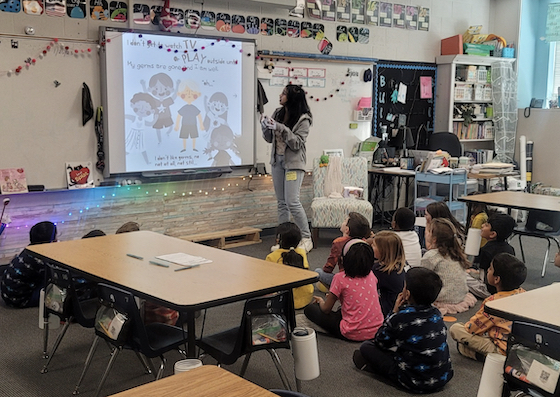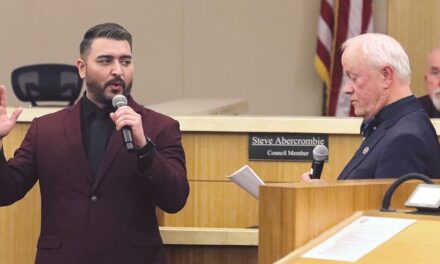

Remediate co-founder Aanandi Thakur teaches elementary students about germs.
DURHAM – Two 17-year-old high school seniors are working to decrease disparities in health care by educating and informing minority communities about their rights.
Rhea Kothur and Aanandi Thakur, of Concord, North Carolina, attend the North Carolina School of Science and Mathematics in Durham. After college, Kothur plans to go into the medical field, and Thakur plans to work in biotechnology.
Kothur and Thakur, who are Asian American, formed Remediate as freshmen, a student-led advocacy organization of more than 2,000 students globally who want to increase public awareness of medical malpractice, health care disparities and healthy habits, especially among minorities.
“We were trying to figure out where we could have the most impact in our community based on our personal experiences. I had an experience with medical malpractice where my grandfather passed away due to COVID-19. He recovered from COVID-19, but passed away due to negligence in his hospital, medical malpractice, and he was a minority group,” Thakur said.
“My experience was in health care disparities,” Kothur said. “I used to volunteer at a local hospital, in the cancer center, where I noticed a large amount of disparity with patients who were Spanish speaking or didn’t speak English as their first language in how they were treated. Oftentimes, I felt the health care workers were more hostile to them, and it was just harder for them to get the treatment that they deserve.”
While many public health initiatives focus on specific diseases and health issues, Thakur said Remediate focuses on the systemic reasons behind them. “Our primary goal is to educate our communities and to create youth leaders in their own mini communities who can further educate groups of people. We want to create a culture of health literacy and understanding. There are a lot of resources available, but what we really want to focus on is creating that community of people where these resources can be used and understood,” she said.
According to the Department for Health and Human Services’ Office of Minority Health, African Americans are at higher risk for heart disease, stroke, cancer, asthma, influenza and pneumonia, diabetes, and HIV/AIDS. And, according to the Commonwealth Fund, which tracks health care in each state, Black and American Indian and Alaska Native people live fewer years than white and Hispanic people, and are more likely to die from treatable conditions.
The COVID-19 pandemic further widened the gap in health care disparities, having a disproportionate impact on Black, Hispanic and AIAN people, and causing a sharper decline in average life expectancy for these groups.
Kothur and Thakur said their resources and initiatives have reached over 40,000 people globally. Through their first initiative, Heal It, they taught elementary school students in the Charlotte Mecklenburg area basic health care literacy. They recently distributed pamphlets to residents in Raleigh and Durham that define health care terms and list contact information directing people where to go to address health care disparities.
V “The Your Health Matters campaign focuses on educating underserved racial and ethnic minority groups – the most affected by these issues – about their health care rights,” Kothur said. “We’ve developed a range of resources, including bilingual pamphlets in Spanish and English, which we’ve distributed throughout communities. To date, our efforts have reached hundreds of local residents.
“It’s important for people to be their own health advocate because nobody’s going to be able to fight for your rights like you can, and so if we give everyone the ability and the resources to understand their own health care rights, they’ll have a better idea of how to ask for what they need in the doctor’s office and how to speak up when the doctor isn’t providing them with the appropriate care that they deserve.”
Visit: https://sites.google.com/view/remediateorg.




